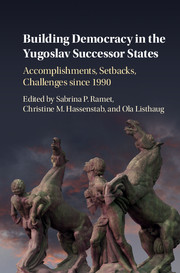 Building Democracy in the Yugoslav Successor States
Building Democracy in the Yugoslav Successor States from Part I - Introduction and Theory
Published online by Cambridge University Press: 25 May 2017
Political culture, i.e. citizens’ values, attitudes, and behaviors within the political community, are one of the defining features of a country, having important consequences for the lives of its citizens as well as for the functioning of the state. In this sense, particularly democratic political culture – mass orientations compatible with and representing the ethos of democracy – is crucial for the stability and functioning of a democratic system. Since the analysis of past and present political culture may also predict future democratic functioning, it is especially important to examine the levels and patterns of political culture in newer, post-communist democracies, which are often characterized as fragile and unstable.
The aim of the present chapter is to examine political culture in the Yugoslav successor states and to compare it both cross-nationally and longitudinally within the wider European context. The first section of the chapter gives a brief overview of classic and more recent conceptualizations of political culture and deals with the importance of political culture for a functioning democracy. The second section presents in brief some explanations concerning cross-national variations in political culture, together with a brief summary of findings of previous research in Yugoslav successor states. In the third section the main research questions and hypotheses are outlined, while the fourth section presents data sources and democratic political culture indicators used in our empirical analysis. The fifth section presents our results and the last section provides a tentative conclusion to our findings.
Conceptualizations of Political Culture
Political culture is a central concept in the social sciences, traditionally referring to a set of political values, beliefs, attitudes, and behaviors that are characteristic of a particular political community (country, region, social group, political elite, etc.). Before the twentieth-century classical authors were using other terms to speak of political culture and there was a consensus on the main notion of political culture (which dates back to ancient times) – the central importance of values and beliefs of citizens for the working and survival of the political system they live in.
To save this book to your Kindle, first ensure no-reply@cambridge.org is added to your Approved Personal Document E-mail List under your Personal Document Settings on the Manage Your Content and Devices page of your Amazon account. Then enter the ‘name’ part of your Kindle email address below. Find out more about saving to your Kindle.
Note you can select to save to either the @free.kindle.com or @kindle.com variations. ‘@free.kindle.com’ emails are free but can only be saved to your device when it is connected to wi-fi. ‘@kindle.com’ emails can be delivered even when you are not connected to wi-fi, but note that service fees apply.
Find out more about the Kindle Personal Document Service.
To save content items to your account, please confirm that you agree to abide by our usage policies. If this is the first time you use this feature, you will be asked to authorise Cambridge Core to connect with your account. Find out more about saving content to Dropbox.
To save content items to your account, please confirm that you agree to abide by our usage policies. If this is the first time you use this feature, you will be asked to authorise Cambridge Core to connect with your account. Find out more about saving content to Google Drive.